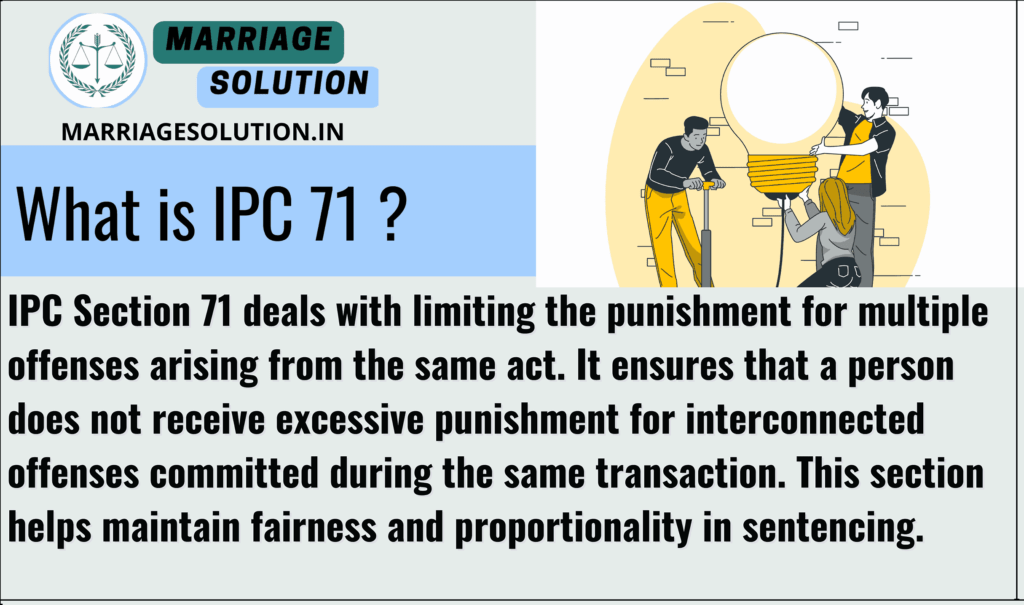Introduction of IPC 71
The Indian Penal Code (IPC) is a comprehensive legal document that outlines various laws and regulations in India. IPC Section 71 addresses the issue of punishment for an offense when a person is convicted of several offenses connected to the same act. This section ensures that the punishment is fair and just.
What is IPC Section 71 ?
IPC Section 71 deals with limiting the punishment for multiple offenses arising from the same act. It ensures that a person does not receive excessive punishment for interconnected offenses committed during the same transaction. This section helps maintain fairness and proportionality in sentencing.

Section 71 of IPC Overview
IPC Section 71 deals with limiting the punishment for multiple offenses that arise from the same act or transaction. It ensures that a person does not receive excessive punishment for interconnected offenses committed at the same time.
Some key points about this section:
- Fair Punishment Limitation
- It limits the extent of punishment for a person convicted of multiple offenses related to the same act or incident.
- This ensures the individual is not excessively punished for a single act involving various offenses.
- Multiple Offenses, Single Act
- This section applies when several offenses occur from the same transaction or act.
- It aims to prevent cumulative punishment that is more severe than the primary offense.
- Proportional Sentencing
- By limiting punishment, it ensures proportionality in sentencing.
- The punishment should reflect the gravity of the main offense, rather than the number of connected offenses.
- Judicial Discretion
- It allows judges to use their discretion to impose a fair sentence that does not exceed the punishment for the most severe offense among the interconnected offenses.
- Preventing Double Jeopardy
- This section prevents the principle of double jeopardy, where an individual might be punished multiple times for the same act.
- It ensures justice is served without redundancy.
- Clarity in Sentencing
- It provides clarity in legal proceedings by defining how punishments should be administered for interconnected offenses, promoting consistency and fairness in the judicial process.
IPC 71 Punishment
IPC Section 71 specifies that if a person is convicted of multiple offenses related to the same act, the total punishment should not exceed the maximum punishment for any one of those offenses. The section aims to prevent excessive cumulative punishment.
71 IPC bailable or not ?
The bailability of offenses under IPC Section 71 depends on the nature of the primary offense. Since this section deals with sentencing and not specific offenses, the bail conditions are determined by the specific offenses involved.
Section 71 IPC in short information
| Offense | Definition | Punishment | Bailable or Not |
|---|---|---|---|
| Multiple offenses connected to the same act | Limitation on cumulative punishment for interconnected offenses | Not to exceed the punishment for the most severe offense | Depends on the specific offenses involved |
IPC 71 FAQs
What does IPC Section 71 define?
IPC Section 71 defines the limitation on cumulative punishment for multiple offenses arising from the same act.
Is there a specific punishment prescribed under IPC Section 71?
No, IPC Section 71 does not prescribe a specific punishment but limits the total punishment to that of the most severe offense among interconnected offenses.
Does IPC Section 71 address bailability?
IPC Section 71 itself does not address bailability. The bail conditions depend on the specific offenses involved.
Why is IPC Section 71 important?
IPC Section 71 is important to ensure fairness and proportionality in sentencing, preventing excessive cumulative punishment for interconnected offenses.
If you need support with court proceedings or any other legal matters, don’t hesitate to reach out for assistance.
Court or any other marriage-related issues, our https://marriagesolution.in/lawyer-help-1/ website may prove helpful. By completing our enquiry form and submitting it online, we can provide customized guidance to navigate through the process effectively. Don’t hesitate to contact us for personalized solutions; we are here to assist you whenever necessary!
